|
|
|
Sort Order |
|
|
|
Items / Page
|
|
|
|
|
|
|
| Srl | Item |
| 1 |
ID:
093780
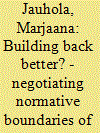

|
|
|
|
|
| Publication |
2010.
|
| Summary/Abstract |
This article focuses on gender mainstreaming policies and advocacy on gender equality in the post-tsunami context in Nanggroe Aceh Darussalam. Through the analysis, this article illustrates how gender mainstreaming policy documents and gender advocacy of the provincial and central government, when drawing from sex/gender division and binary of genders, reproduce heteronormative boundaries. By focusing on details, I argue that the image of the heteronormative nuclear family participates in normalising other identity categories; such as urban and middle-class. I also provide examples of how simultaneous to the production of dominant norms, gender advocacy challenges heteronormativity and norms governing heterosexuality and actively question the dominant gender norms. Drawing from postcolonial feminist and recent queer critiques, I argue that advocacy that solely focuses on gender and/or sexuality reduces human bodies and their desires to simplistic stick figures. Thus, it remains blind to other forms of violence, such as global economic and political frameworks that define 'building back better' primarily as recovery and rehabilitation of economy, assets and labour force.
|
|
|
|
|
|
|
|
|
|
|
|
|
|
|
|
| 2 |
ID:
093783
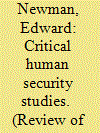

|
|
|
|
|
| Publication |
2010.
|
| Summary/Abstract |
From a critical security studies perspective - and non-traditional security studies more broadly - is the concept of human security something which should be taken seriously? Does human security have anything significant to offer security studies? Both human security and critical security studies challenge the state-centric orthodoxy of conventional international security, based upon military defence of territory against 'external' threats. Both also challenge neorealist scholarship, and involve broadening and deepening the security agenda. Yet critical security studies have not engaged substantively with human security as a distinct approach to non-traditional security. This article explores the relationship between human security and critical security studies and considers why human security arguments - which privilege the individual as the referent of security analysis and seek to directly influence policy in this regard - have not made a significant impact in critical security studies. The article suggests a number of ways in which critical and human security studies might engage. In particular, it suggests that human security scholarship must go beyond its (mostly) uncritical conceptual underpinnings if it is to make a lasting impact upon security studies, and this might be envisioned as Critical Human Security Studies (CHSS).
|
|
|
|
|
|
|
|
|
|
|
|
|
|
|
|
| 3 |
ID:
093793
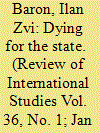

|
|
|
|
|
| Publication |
2010.
|
| Summary/Abstract |
This article introduces the problem of having to risk one's life for the state in war, asking first why this question is no longer asked in the just war literature and then suggesting five issues that relate to this question: 1) that of individual consent, 2) whether or not any state can be justified in obliging its citizens in this regard and whether or not the type of government is important, 3) whether or not the problem of the obligation differs between conscript and volunteer armies, 4) the problem of political obligation and how any individual could be justifiably obliged to risk his or her life for the state in war, and 5) the question of whether a citizen may be obliged to go into any war. The argument is that these questions are no longer given much attention in the just war literature because of the way that the concept of proper authority has come to be understood. The article concludes by suggesting that the problem of the 'obligation to die' should be included in our understanding and use of just war theory and the ethics of war.
|
|
|
|
|
|
|
|
|
|
|
|
|
|
|
|
| 4 |
ID:
093789
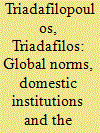

|
|
|
|
|
| Publication |
2010.
|
| Summary/Abstract |
This article examines the liberalisation of immigration policy in Canada and the US in the post-World War II era. I argue that shifting norms pertaining to race, ethnicity, and human rights cast longstanding discriminatory policies in Canada and the US in a highly critical light. Opponents of racially discriminatory immigration policies exploited this shift in normative contexts to highlight the disjuncture between Canada and the US' postwar commitments to liberal norms and human rights, on the one hand, and their extant policy regimes, on the other. The resulting pressure set in motion comparable processes of policy stretching and unravelling, which culminated in policy shifting in the mid-1960s. Policy shifting was, however, subject to very different political dynamics. Whereas Canada's institutional configuration granted the executive branch and bureaucracy a high degree of autonomy that enabled experimentation, the greater openness of the American political system led to a more politicised process, marked by compromises and deal-making. Thus while changing norms prompted the liberalisation of immigration policies in both countries, differences in their domestic political contexts resulted in very different admissions regimes.
|
|
|
|
|
|
|
|
|
|
|
|
|
|
|
|
| 5 |
ID:
093779
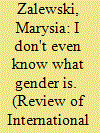

|
|
|
|
|
| Publication |
2010.
|
| Summary/Abstract |
In this article I discuss some of the connections between gender, gender mainstreaming and feminist theory. As a global initiative, gender mainstreaming is now well established; but the role of feminism and feminists in achieving this success is questionable. Some, including Harvard Law Professor Janet Halley claim that feminists, particularly in the realm of governance feminism, have been extremely successful. Yet despite this success Halley invites us to 'take a break from feminism'. I consider this political and intellectual invitation in this article in order to shed some light on the relationship between gender mainstreaming and feminism but also to probe what Robyn Wiegman refers to as a 'critical incomprehension' around feminism. My discussion includes a brief analysis of the imagery used in documentation relating to the United Kingdom's Gender Equality Duty Legislation; the latter a contemporary example of a legislative attempt to properly mainstream gender. In conclusion I return to the Halley's invitation to 'take a break from feminism' and introduce, by way of contrast, Angela McRobbie's recent discussion of post-feminism ultimately suggesting that we might see Halley's call, as well as the popularity (and 'failures') of gender mainstreaming as examples of post-feminist practice.
|
|
|
|
|
|
|
|
|
|
|
|
|
|
|
|
| 6 |
ID:
093781


|
|
|
|
|
| Publication |
2010.
|
| Summary/Abstract |
Gender mainstreaming is portrayed as the next step in the global gender equality landscape and has been widely adopted internationally in a variety of governments and political organisations. However, the radical potential of gender mainstreaming to transform organisations has not been fulfilled. In this article, I explore three paradoxes which are inherent in the intent, implementation and institutionalisation of gender mainstreaming. I argue that we cannot fully understand these global paradoxes without a better understanding of local experiences which underpin them in the everyday working lives of those people involved in advocating gender mainstreaming. Using results from an institutional ethnography of the implementation of the Gender Equality Duty by gender mainstreaming advocates in the Scottish Executive, I show that bureaucratic practices, fossilised norms and the continued reliance on soft measures to promote mainstreaming are reflections at the local level of barriers to the advancement of global gender mainstreaming. By taking seriously the local practices and knowledge of those who do gender mainstreaming, we can reflect on the inherent tensions within gender mainstreaming that prohibit its ability to truly transform the gender landscape at both the local and global level.
|
|
|
|
|
|
|
|
|
|
|
|
|
|
|
|
| 7 |
ID:
093786


|
|
|
|
|
| Publication |
2010.
|
| Summary/Abstract |
Scholars in international relations have long known that ideas matter in matters of international politics, yet theories of the discipline have failed to capture their impact either in the making of foreign policy or the nature of the international system. Recent reengagement with the insights of classical realists has pointed to the possibility of a neoclassical realist approach that can take into account the impact of ideas. This article will suggest that the study of grand strategy can enlighten the intervening ideational variables between the distribution of power in the international system and the foreign policy behaviour of states, and thus constitute the key element in a neoclassical realist research agenda.
|
|
|
|
|
|
|
|
|
|
|
|
|
|
|
|
| 8 |
ID:
093791
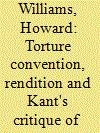

|
|
|
|
|
| Publication |
2010.
|
| Summary/Abstract |
By what standards ought we to judge politicians? The article addresses the question in the light of the treatment of two controversial issues in contemporary world politics: the implementation of the 1984 UN Convention against Torture; and the post 9/11 rendition of terrorist suspects to US authorities by European governments. Their treatment brings out the way in which the role of political leaders is popularly conceived and understood. This conventional understanding is contrasted with the role recommended by Kant's political philosophy. An answer to the question depends on how we conceive politics in the first place. If politics is seen as a 'free for all' where all strategies can be canvassed then the response will be entirely different from a situation where we consider ourselves bound by rules of legitimacy and its attendant problems of morality and law. The article represents a rejection of certain received accounts of politics and approval of a Kantian view. The account of politics which in one respect or another tries to drive a wedge between politics and ordinary morality is seen as inferior to a Kantian concept of politics which is always conditioned by morality.
|
|
|
|
|
|
|
|
|
|
|
|
|
|
|
|
| 9 |
ID:
093784
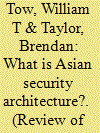

|
|
|
|
|
| Publication |
2010.
|
| Summary/Abstract |
Architecture' has emerged as the new catchphrase in Asian security politics. Despite its growing centrality, insufficient attention has thus far been given to defining the term, often leading to its imprecise usage. This article seeks to redress that shortcoming. It reviews the ways in which various scholars and practitioners have employed the term 'security architecture' and highlights the anomalies that their often differing employment has created. The article proposes a set of guidelines to aid conceptualisation and application of the term. In so doing it establishes criteria to ascertain what 'security architecture' actually exists in the Asian region, and must ultimately exist to assure regional security.
|
|
|
|
|
|
|
|
|
|
|
|
|
|
|
|
| 10 |
ID:
093787


|
|
|
|
|
| Publication |
2010.
|
| Summary/Abstract |
Pre- and post-agreement discourses are an integral part of international relations. Yet, they only matter sometimes as an empirical analysis of European judicial discourses shows. State of the art Habermasisan and social psychology approaches on effective arguing cannot sufficiently explain variation in the success of discourses. This requires a fine-grained perspective: Only if actors share yardsticks fitting to the issue at stake, they can commonly assess the quality of arguments and incrementally develop a consensus. If such issue-specific reference standards are absent, actors talk at cross-purposes and dissent prevails. The article empirically illustrates the importance of intersubjective validity for the effectiveness of discourses and tests its central claim against alternative constructivist and rationalist explanations.
|
|
|
|
|
|
|
|
|
|
|
|
|
|
|
|
|
|
|
|
|